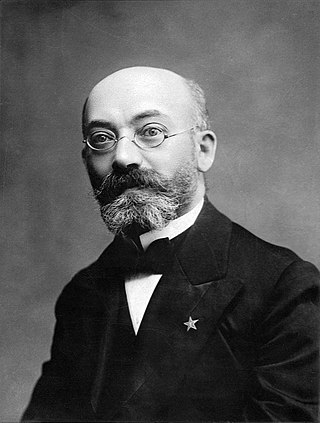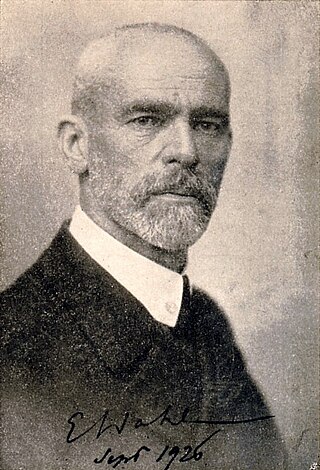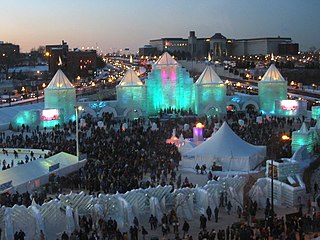
Esperanto is the world's most widely spoken constructed international auxiliary language. Created by L. L. Zamenhof in 1887, it is intended to be a universal second language for international communication, or "the international language". Zamenhof first described the language in Dr. Esperanto's International Language, which he published under the pseudonym Doktoro Esperanto. Early adopters of the language liked the name Esperanto and soon used it to describe his language. The word esperanto translates into English as "one who hopes".

Esperantujo or Esperantio is the community of speakers of the Esperanto language and their culture, as well as the places and institutions where the language is used. The term is used "as if it were a country."

L. L. Zamenhof developed Esperanto in the 1870s and '80s. Unua Libro, the first print discussion of the language, appeared in 1887. The number of Esperanto speakers have increased gradually since then, without much support from governments and international organizations. Its use has, in some instances, been outlawed or otherwise suppressed.

L. L. Zamenhof was the creator of Esperanto, the most widely used constructed international auxiliary language.

The Universal Esperanto Association, also known as the World Esperanto Association, is the largest international organization of Esperanto speakers, with 5,501 individual members in 121 countries and 9,215 through national associations in 214 countries. In addition to individual members, 70 national Esperanto organizations are affiliated with UEA. Its current president is Prof. Duncan Charters. The magazine Esperanto is the main publication to inform UEA members about everything happening in the Esperanto community.
A student society, student association, university society, student club, university club, or student organization is a society or an organization, operated by students at a university, college, or other educational institution, whose membership typically consists only of students and/or alumni.
A students' union or student union, is a student organization present in many colleges, universities, and high schools. In higher education, the students' union is often accorded its own building on the campus, dedicated to social, organizational activities, representation, and academic support of the membership.

Edgar von Wahl was a Baltic German mathematics and physics teacher who lived in Tallinn, Estonia. He also used the pseudonym Julian Prorók, and is best known as the creator of Interlingue, an international auxiliary language that was known as Occidental throughout his life.

The Saint Paul Winter Carnival is an annual festival in Saint Paul, Minnesota, United States.

The Swedish Evangelical Mission (SEM) is an independent, low-church, New Evangelical movement within the Church of Sweden. Described as "middle-of-the-road" due to maintaining its independence within the church while not separating from it, the association emphasizes the importance of lay involvement and is rooted in 19th-century Swedish revivalism and the Mission Friends movement.

A faluche is a traditional cap worn by students in France. It is a black velvet beret, decorated with colored ribbons and badges.

Gavriil Vasilyevich Baranovsky, also Baranovskii was a Russian architect, civil engineer, art historian and publisher, who worked primarily in Saint Petersburg for the Elisseeff family, but also practiced in Moscow and produced the first town plan for Murmansk.

Aleksander Ossypovich Zederbaum was a Polish-Russian Jewish journalist who wrote primarily in Hebrew. He was founder and editor of Ha-Melitz, and other periodicals published in Yiddish and Russian.

Max Josef Metzger was a Catholic priest and leading German pacifist who was executed by the Nazis during World War II.

Hector Hodler was a Swiss Esperantist who had a strong influence on the early Esperanto movement.

Leopold Einstein was a Jewish teacher, vendor, and writer. He was one of the early proponents of Esperanto.
Osip Arkadyevich Yermansky, born Yosif Arkadyevich Kogan, and known by the pseudonyms M. Borisov, A. O. Gushka, Meerovich, and P. R., was a Russian Social Democratic political figure, economic theorist, pamphleteer, and memoirist. He was one of the originators of the Soviet school of management, in particular, its psychophysiological tendency. He regarded scientific management as a syncretic, interdisciplinary system, drawing material from other scientific disciplines, such as technology, economics, psychology, and physiology.

La Esperantisto, stylised as La Esperantisto., was the first Esperanto periodical, published from 1889 to 1895. L. L. Zamenhof started it in order to provide reading material for the then-nascent Esperanto community.

Abram Antoni Kofman, also known as Abraham S. Kofman, was a Russian-Jewish accountant, and poet and translator in several constructed languages. From Odesa, Russian Empire, Kofman learned Esperanto in 1889 and was an early supporter of the language's adoption. He was one of the first Russian Jews to write poetry in Esperanto and has been described by several as a "pioneer". His work appeared in several Esperanto-language magazines and early anthologies, including the Fundamenta Krestomatio. He was the translator of several sections of the Hebrew Bible in both Esperanto and its daughter language, Ido. He was the first Ancient Greek–Esperanto translator, producing a rendition of parts of the Iliad starting in 1895.
















